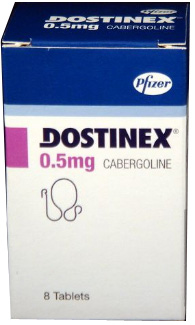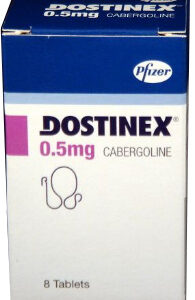Generic and Brand Names
Dostinex is the brand name for the generic drug cabergoline. Cabergoline is a dopamine agonist medication that is used to treat hyperprolactinemia (high levels of prolactin).
Therapeutic Classification
Dostinex belongs to a class of medications known as prolactin inhibitors. Its primary function is to decrease the production of the hormone prolactin from the pituitary gland.
Indications and Usage
Dostinex is indicated for the treatment of disorders due to high levels of prolactin, such as some cases of infertility, menstrual problems, and unwanted breast milk production. It is also used in the treatment of prolactin-producing pituitary gland tumors (prolactinomas).
Pharmacology and Mechanism of Action
Cabergoline, the active ingredient in Dostinex, works by simulating the activity of dopamine, a neurotransmitter in the brain that helps control the release of prolactin. By activating dopamine receptors, cabergoline inhibits the secretion of prolactin from the pituitary gland.
Dosing Information
The dosing regimen for Dostinex varies depending on the condition being treated and the response in individual patients. The starting dose is typically low and gradually increased. Frequent monitoring of prolactin levels is essential to determine the appropriate dose.
Interaction with Other Medications
Dostinex can interact with other medications, especially those that affect the central nervous system. Drugs such as antipsychotics, antiemetics, and some antihypertensives may interfere with its action. Inform healthcare providers about any other medications being taken to avoid potential drug interactions.
Special Populations: Pregnancy and Breastfeeding
Dostinex should be used with caution during pregnancy and breastfeeding. There is limited data on its effects in these populations, so it should only be used if the potential benefits justify the potential risks to the fetus or infant.
Administration Instructions
Dostinex is taken orally, usually twice a week. The tablets should be swallowed whole with water, with or without food. However, taking the medication with food may help reduce gastrointestinal side effects.
Possible Side Effects
Though generally well tolerated, side effects of Dostinex may include nausea, headache, dizziness, dry mouth, constipation, or fatigue. Some patients may also experience hypotension or changes in mood or behavior.
Overdose Management
In case of overdose, supportive measures should be undertaken. There is no specific antidote for cabergoline overdose and treatment is symptomatic. Contact emergency medical services immediately if an overdose is suspected.
Pharmacokinetics Profile
Dostinex is rapidly absorbed after oral administration, with peak plasma levels occurring within 0.5 to 4 hours. Its terminal half-life is quite long, typically 63 to 68 hours, which allows for a twice-weekly dosing schedule.
Storage Requirements
Store Dostinex at controlled room temperature, away from light and moisture. Keep out of reach of children and pets to prevent accidental ingestion.
Monitoring Parameters
Patients taking Dostinex require regular monitoring of prolactin levels, blood pressure, and heart function. Periodic assessment of the pituitary gland via Magnetic Resonance Imaging (MRI) may also be necessary to evaluate changes in tumor size in patients with prolactinomas.







Reviews
There are no reviews yet.